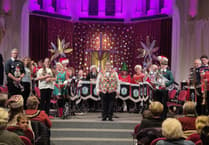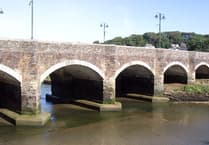BARD, town crier and councillor Robert Tremain has raised his concerns that the historic name of Launceston (Lanstefan) is being spelt incorrectly by a few, writes Zoë Uglow.
Cllr Tremain told fellow members at the full town council meeting on September 19, that although the recent Esedvos Festival held by Gorsedh Kernow had been ‘exceptional’, one point had tarnished the event for him.
Launceston in Cornish is ‘Lanstefan’ but Cllr Tremain raised his concerns to the council after it was noticed at the festival being written ‘Lannstevan’.
Cllr Tremain said: “The feedback I have received has been very positive and everyone spoke very highly of the festival. However, there was one disappointment for me; the Cornish language spelling of Lanson. There were two new publications launched that weekend, and they had it down as ‘Lannstevan’ with a double ‘n’ and a ‘v’ instead of the proper local spelling with an ‘f’.
“Historically we have never used the double n or indeed ‘stevan’. The double n should only be used in positions where the element is stressed. Cornish place-names are not stressed on the first syllable but are always pronounced or accentuated on the second syllable, which does not happen if you have this double n. Also the hard sounding ‘stevan’ has never been used so I don’t know how they came up with that.
“Surely the wishes of the local community and long-standing usage of the spelling Lanstefan should take precedence over a ‘committee decision’ with no local input. You might think I’m nit picking but I think we as a council have a duty to uphold this town’s history!”
Cllr Tremain explained there had been a long fought battle with the Cornish Language Partnership over the town’s Cornish spelling that he was keen to pursue.
In 2012 the council wrote to the partnership with the hopes of getting the views of Launceston’s townspeople adhered to. The clerk at the time, Rita Skinner, wrote to the partnership a second time in May 2013 as no reply had been received.
The letter stated; ‘This council objects to the Lannstevan spelling and wishes the Cornish Language Panel to abide by the wishes of the people of Launceston and retain the historical and traditional local spelling of ‘Lanstefan’ as the Cornish language translation for the town of Launceston’.
Cllr Tremain asked the clerk, Christopher Drake, to write to Cornwall Council on behalf of the town council to share its belief that the ancient capital of Cornwall’s name was still being spelled incorrectly and that local wishes should be taken into account.
He said: “Once it makes its way onto Cornwall Council’s ‘master list’ all spelling of the name will be contrary to what we want. It is a case of the language committee ‘knowing best’ and riding roughshod over local tradition. When the new signs are to be placed in Launceston Castle next year, I expect Historic England will consult Cornwall Council for the language spelling and we will have ‘Kastel Lannstevan’ not Lanstefan.
“So please can we resolve to write to Cornwall Council, strongly asking for our wishes to be adhered to and that the Lanstefan spelling is to be used in all future documents and signs?”
Speaking in support of the idea, Cllr John Conway said: “This is just another case of Truro [Cornwall Council] telling us what we should do. The heritage here is just as important as theirs. This is our town, it has been spelt that way for years and it is not their place to change that.”
Cllr Jane Nancarrow said: “I support Cllr Tremain, I think it is very important that we maintain the correct spelling. For those of us like myself born and brought up in the St Stephens area, the town’s heritage is important and it is up to us to maintain it.”
She jested: “I would also like to say it is very kind of Cllr Conway to come in on supporting our heritage since he is originally from the other side of Devonwall — it just proves how important this is.”
Mayor Margaret Young expressed her thanks to Cllr Tremain for his role in the organisation of the Gorsedh’s Esedvos Festival and for bringing this issue to the council’s attention. She said: “I thoroughly agree with Cllr Tremain that we should write to Cornwall Council and put more pressure on them to get it right.”
It was agreed that a letter sent to the relevant parties at Cornwall Council to ‘keep the pressure on’ and ensure the correct spelling of the town’s Cornish name is used by all in future.
Following the meeting, Jan Edmondson, Bard (Kares Gwrysow) and chairwoman of the place-name and signage panel for Akademi Kernewek, which is recognised by Cornwall Council as the definitive body responsible for corpus planning for the Cornish language, explained the panel’s reasoning behind the use of Lannstevan as opposed to the local spelling Lanstefan.
She said: “The study of place names is a specialist area, and Cornish place names have been studied in depth over the last century. Increasing understanding and re-interpretation of our Cornish place names, which have changed over many centuries, is enhancing our sense of Cornish identity. In the early days of the language revival, the unified Cornish spelling system was used, and has since then been joined by Kernewek Kemmyn and more recently the ‘Standardised Written Form’ [SWF]. Spelling change is not undertaken lightly, and as our understanding of the remaining medieval texts becomes deeper through continued research, we become more aware of the likely pronunciation, and have revised the spelling to reflect this.
“The Anglo-Saxon element ‘ton’ is not included in the Cornish translations, as this is a later addition to an assumed earlier form. The unified Cornish spelling Lanstefan does not reflect the historic forms of the place name.
“The spelling was modified in the late 1980s to Lannstefan in Kernewek Kemmyn and very recently to Lannstevan in SWF following further consideration by the street signage and place names panel of Akademi Kernewek. We believe that this spelling most closely represents the earliest forms of the name.
“It is possible that the church at St Stephens had an earlier dedication to a Celtic saint, which is now lost.”





Comments
This article has no comments yet. Be the first to leave a comment.